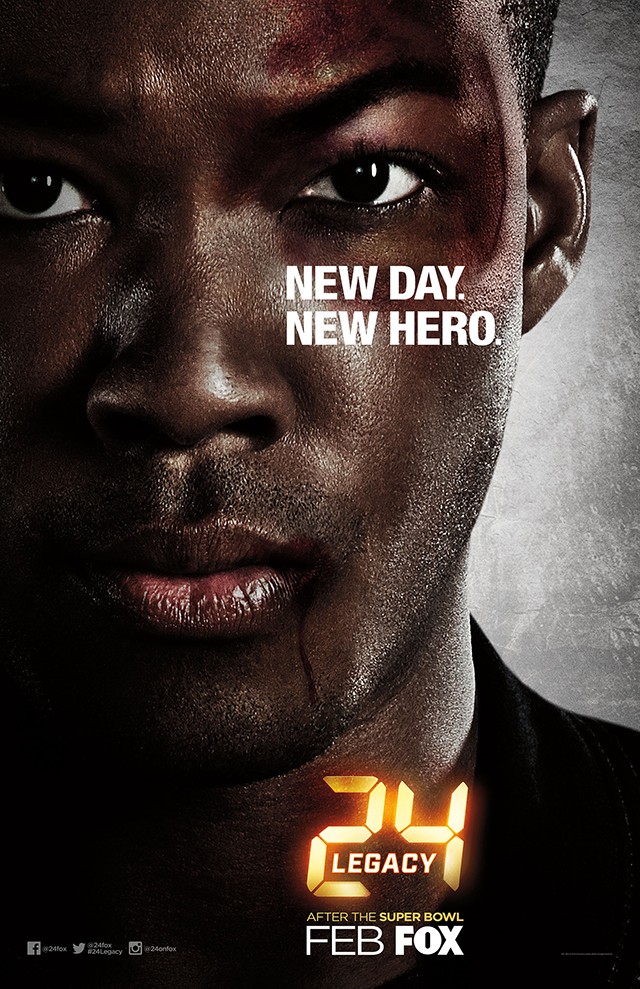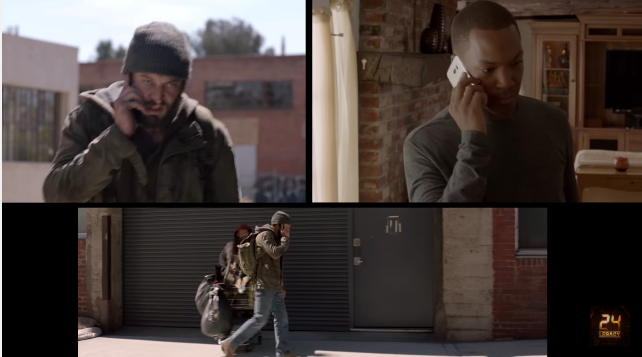Everyday Heroes
“24: Legacy,” “Quantico,” and Islamophobia onscreen.

The first time I visited a mosque, I was twenty. I was not, am not, particularly religious, but a Muslim friend of mine was passing through Houston, visiting family from the East Coast, and in the middle of a nothing afternoon, smoking mints up and down Midtown, he asked if I’d ever been to the city’s Islamic Education Center. I didn’t know what a mosque looked like, or where it would be, or what to expect, because the only Islamic centers of worship I’d seen were on television, and in theatres — plopped handily over green screens, coated under layers of artificial sand. But Ivan grabbed his hoodie, and his keys, tugging my phone from his charger, and said we’d make it through afternoon prayer in under an hour if he sped.
My working knowledge of Islam was built on absence and erasure: I hadn’t been exposed, and I hadn’t sought it out either. I’d sooner have sooner caught dinosaurs or talking fish on film than a thoughtful depiction of life in an Arab country — and what little exposure I could find was compartmentalized and packaged for chaos.
By and large, geopolitical thrillers in the 2000s meant white men navigating a terrorist plot in the making by brown/black/Asian folks, or white men in the midst of enduring some sort of active terrorist plot by brown/black/Asian folks, or white men plotting retribution in the aftermath of an act of terror by brown/black/Asian folks. And while the need for an other-ized villain extends to the very origins of American cinema, Islam and the Middle East in particular (and brown faces in general) are disproportionately cast in the light of danger — people to be avoided, apprehended, or foiled. Your princess needs saving, and it’s the hairy brown man holding her hostage. Your globalized investors are seeking protection from faceless insurgents of the east. The planet is under attack from some intergalactic scourge, brown bodies, imminent threats both near and far.

In this way, FOX’s “24: Legacy” presents yet another problem. As an offshoot of the original “24,” the series’ plot is rooted in similar territory — which is to say it doesn’t really matter much at all. It can be safely placed in the bucket of Tuesday-night counterterrorism. The show’s antagonism is a decidedly jihadist threat overshadowing the country’s intelligence agencies, only this time there are also Inner City Threats to navigate (gangs), a connection that surely made sense to the writers because the protagonist is black.

“Legacy”’s central problem, as ever, stems from those all-encompassing “terrorists.” We are told there are sleeper cells working amongst the protagonists. A major character’s attendance of a presently radicalized mosque is used as political blackmail. There are the show’s usual questions regarding continuity (if we’re experiencing 24 hours over the course of 41 minutes, how long is each minute?), and plausibility, and causality. While the series occasionally encourages some semblance of thought (To what extent do your personal allegiances supersede your country’s best interests?), it simultaneously discourages too much of it, because it mostly assumes in its audience a latent unease with Islam and brown people (and, as if to drive the point home, “Legacy” recently used live footage from Nairobi’s 2013 Westgate mall shooting to further a half-baked point — FOX has since “apologized” for screening the footage, in which at least 67 civilians were killed and 175 were injured).
Primetime television, for all of its frivolity, is a still a tool and an influencer. Simply put, visibility matters. Reverberations of the empowerment illustrated in Shondaland, or “Fresh Off the Boat”’s pokes at assimilation, or “Jane the Virgin”’s domestic absurdities, or an office discussion on “Black-ish”, or a relatively chaste kiss on “The Real O’Neals” are felt deeply and immediately. Their stories matter because we make them matter.
ABC’s “Quantico,” despite its own narrative shortcomings, is another example of harnessing and subverting that visibility — a young half-Indian* woman, Alex Parrish, is a top recruit for the FBI tasked with protecting a government that wants to eradicate her. The series opens with a literal explosion, with our protagonist at the center, and she spends many episodes attempting to convince her (mostly white) colleagues that she’s innocent of the subterfuge that follows. “Quantico” may be tacky in its approach, but it is remarkable for if no other reason than the fact that its writers actually went and pulled the damn thing off: brown people are both the series’ instigators and its saviors. Had the narrative threads been pulled tighter, “Quantico” really could have been something to behold — and yet, it still is, for the simple fact of its existing at all.
This isn’t to say that all storylines should forever cast every minority in objectively positive lights; on the contrary, ambiguity is illuminating. But it is foolish and destructive to act as though the entertainment industry isn’t as responsible for bending the tide of public perception as any executive order. The difference might not be tantamount to the man who suddenly realizes his Syrian neighbors are human too, but what will always matter is the banality that televised recognition applies. It gives you pause, those pauses becomes moments, and those moments make up a life. None of us is more than a conduit for the narratives we’ve consumed.
What Makes the Muslim Ms. Marvel Awesome: She’s Just Like Everyone
The happy medium just might reside in a narrative like Ms. Marvel’s: a young woman named Kamala Kahn is charged with defending her city from mutant and extraterrestrial threats — not because she is Pakistani, or Muslim, or even a talented young woman in an unpredictable comic book city — but because her idol did the same, and every teenager needs an altar, and while Kamala’s religion certainly informs her narrative, Ms. Marvel’s narrative isn’t solely informed by her religion. Kahn is a complete person. We’re given her successes, falsehoods, and faults. Ms. Marvel is a young Arab-American’s coming-of-age, miracles, mistakes, and all.

Our drive to the IEC off of Westheimer Road wasn’t very long, and the building was unassuming. A woman in the lobby welcomed us, and Ivan slipped into the group kneeling behind her. I knelt in the back, and he prayed for some time, and then he finished, and we left. Afterwards, Ivan took me to a diner for cheeseburgers and fries. He asked me how I felt; I said I was fine, and he nodded. That was good, he said, because he’d been worried — he said you never knew how someone would react. We talked about the World Cup, and the weather, and everything else but the mosque. It was simply, then and now, a beautiful place that we’d gone to. Ivan left Houston a few days later. It took a few more weeks for me to realize how rare of a moment it was, and a few years more after that for me to come down from the anger it brought.
There’s a moment near the end of Mohsin Hamid’s novel, The Reluctant Fundamentalist, where the narrator, having experienced the full brunt of “American exceptionalism,” comments on its implications:
It seemed to me then — and to be honest, sir, seems to me still — that America was engaged only in posturing. As a society, you were unwilling to reflect upon the shared pain that unites you with those who attacked you. You retreated into myths of your own difference, assumptions of your own superiority. And you acted out these beliefs on the stage of the world, so that the entire planet was rocked by the repercussions of your tantrums, not least my family, now facing war thousands of miles away. Such an America had to be stopped in the interests not only of the rest of humanity, but also in your own.
In a moment where the very language we use to ascribe legitimacy to a piece of information is being questioned, it can be tempting to succumb to the notion that our narratives are changing too. But that isn’t the case — we control the stories we put into the world. All of it counts, and the condensation of bigotry, and hate, and fear bottled into hour-long propaganda commercials infects every eye it crosses. “24: Legacy” alludes to a very particular nation-state — forever-warring, consistently tumultuous; with distinct, clear-cut racial and religious compartmentalization — a country that doesn’t exist. But the image still festers. It leaves an imprint. It sticks with us in our grocery stores, and our schools, and our subways, and our voting booths, and the streets many took to afterwards.
Two Muslim boys find solace not in their city, but in each other. A Lebanese family recounts their history as life in the States imprints itself across their lineage. A young hacker in unnamed country attempts to cripple an authoritarian government, combat a burgeoning culture of censorship, and still live out his bildungsroman. What makes us American — the thing that’s supposed to make us unique — is that anyone can play the hero. Anyone of us can don the cape. And until the country’s pop culture allows Muslims the benefit of the doubt, it will remain no less culpable than the entities near and far doing their best to divide us.
*Correction: This post originally identified Alex Parrish as Pakistani. She is half-Indian. The Awl regrets the error.
